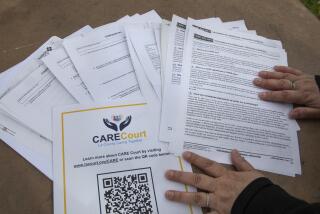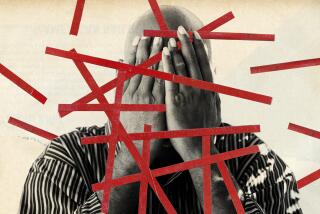Rapist Fails Mental Test, Won’t Be Freed : Prisons: Reginald Muldrew will take exam again in six months, officials say. Law says he must be released in a year.
- Share via
Serial rapist Reginald Donald Muldrew, whose pending parole stirred tremendous protests by San Gabriel Valley residents, failed his psychiatric exam and will not be released from state prison as scheduled, state corrections officials said Thursday. He will probably remain in prison for at least six more months.
Muldrew becomes the sixth sex offender since March whose parole has been blocked by the inability to pass a last-minute psychiatric evaluation. Corrections officials have begun using the tactic in what some of them admit is a desperate attempt to keep offenders in custody.
Under the state’s determinate sentencing law--originally passed to keep judges from issuing lenient sentences--prisoners must be let out of prison after a specific number of years. Muldrew, a suspect in 200 rapes in the Los Angeles area during the 1970s, has been in prison for 15 years.
Department of Corrections officials said Muldrew, 46, known as the “pillowcase rapist” because he put pillowcases and similar pieces of cloth over his victims’ heads, suffers from a mental disorder that makes him a danger to others and for which treatment is not available in the community. Spokesman Bill Gengler said he could not comment specifically on the mental disorder involved.
Muldrew was scheduled to be paroled Sunday in Covina.
Covina police and city officials launched a campaign to block Muldrew’s parole after being told by corrections officials that Muldrew was going to live in Covina. State officials never confirmed a specific city of residence.
About 20,000 signatures were collected on petitions demanding that Muldrew be kept in custody.
“This shows what citizens can do when they organize together to oppose something they don’t believe in,” Covina Mayor Thomas M. O’Leary said.
A hearing will be conducted in about 30 days to determine whether Muldrew should have his parole revoked and be kept in prison for psychiatric treatment. The hearings are generally formalities that confirm the decision to revoke parole.
If all goes as expected, Muldrew would remain in prison for six months, then undergo another psychiatric exam, Gengler said.
“There probably is not an instance where someone has failed (the psychiatric exam) and six months later has passed it,” Gengler said.
Regardless, a year from now Muldrew must be released because his prison and parole terms will have expired. At that point, he can move wherever he chooses as long as he registers with local police as a sex offender.
“There is nothing that the Department of Corrections can do to retain Muldrew” after the year is up, Gengler said.
One woman who said she was raped by Muldrew expressed relief Thursday about the flunked exam, but worried that she and other victims would have to go through the same anxiety in six months.
“Obviously, the system works for criminals,” she said. “I’m laughing, I guess because I don’t want to cry to think that he could be free.”
Muldrew was convicted on six counts of sexual assault and numerous other felonies in 1978 and is suspected by police of having committed more than 200 rapes and 150 robberies in Los Angeles from 1975 to 1978.
Among the tactics used by Covina officials to keep Muldrew out of their community were protest rallies and soliciting victims of Muldrew who live within 35 miles of Covina. Under state law, parolees cannot be released within 35 miles of their victims or those who testified against them in court.
Art Lucero, deputy regional parole administrator, said the state decided to perform the psychiatric evaluation partly because of the extreme violence involved in the crimes for which Muldrew was convicted. He at times beat and punched his victims, or put out cigarettes on their skin.
Lucero said he was not sure whether Muldrew had a history of mental illness before his crimes.
Muldrew was transferred from Pelican Bay State Prison in Northern California to the state prison in Lancaster on Monday in preparation for his parole. The psychiatric exam was completed Wednesday. He has also served time at San Quentin, where he was a suspect in the 1971 murder of a prison guard but was not prosecuted.
Since March, five other high-profile sex offenders in Southern California have failed eleventh-hour psychiatric exams and been returned to prison. In four cases, the mental health exams were administered on the day of the sex offender’s release from prison. But in Muldrew’s case and one other, rapist David Stanley Lee, corrections officials did not wait for the parole date. Instead, Muldrew and Lee underwent psychiatric exams while they were still in prison.
Under the 1977 determinate sentencing law, sex offenders are released on a predetermined date without having to go before a parole board for clearance.
Corrections officials say they only recently reinterpreted the little-known state code that allows psychiatric testing of parolees. The code does not specify when the evaluations can be administered.
Critics of the state’s new policy complain that the decision to release inmates has been taken away from the parole board and left in the hands of a single psychiatrist.
About 40 Antelope Valley residents who had gathered Thursday afternoon at Lancaster City Park to protest Muldrew’s release applauded loudly when organizers announced that the rapist would remain in prison.
The rally was organized after Antelope Valley residents learned Muldrew had been transferred to the Lancaster prison and feared that he might be paroled in their neighborhood.
Times staff writer Renee Tawa contributed to this story.
More to Read
Sign up for Essential California
The most important California stories and recommendations in your inbox every morning.
You may occasionally receive promotional content from the Los Angeles Times.










